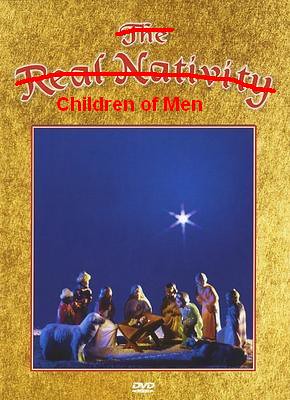 In the forum of uncomfortability, Children of Men ranks highly. The film's a continuous throttle to the senses, an escape film overloaded with socio-political and gender political subtext extraordinaire, and glib to the point of rendering that descriptor inadequate.
In the forum of uncomfortability, Children of Men ranks highly. The film's a continuous throttle to the senses, an escape film overloaded with socio-political and gender political subtext extraordinaire, and glib to the point of rendering that descriptor inadequate.Of the reviews out, I prefer Anthony Lane's review in the New Yorker, which focuses more on Cuarón's statement of broad affairs rather than on his depiction of the personal awakening of Clive Owen's character (Cuarón does a subtle (relative to the bomb-blast of the remainder of the film), and commendable, treatment of the latter, devoid of any melodrama or overanalysis). This is largely because of the visual bombast which Cuarón presents - and doesn't present.
Though Children takes place in the future, the strength of the film's impact is largely in what it doesn't show. Apart from Cuarón's reluctance to fill in narrative backstory, leaving one to speculate on why and how the women of the world have become infertile, his vision of the future is startling: the future, by in large, looks a lot like the present. Outside of a few gadgets here and there (one is always right to assume that computer monitors become better), 20 years from now might as well be now, albeit with alot more decay. Apart from the obvious commentary on the present (Cuarón doesn't flinch in hammering Abu Ghraib imagery over one's head), it also speaks to the idea that (i) we ain't where we should be, and (ii) we're not going to get there, either.
This theme overwhelmed me, and, I suppose, filled in my assumptions on the open-ending conclusion. Without spoiling the ending, the protagonists either end up in safe haven or largely nowhere, and it's anybody's guess as to what happens next. What confuses this even further, then, is the soundtrack for the end credits.
I generally don't put much stock in the end theme, but it's not without purpose that Cuarón goes with the sound of children rather than any sort of music (it should be noted that there's excellent use of atonal ringing in a few places throughout the film, referencing Clive Owen's ringing ears from a bomb blast at the beginning of the film, and creating generally discomfort in-between those creepy chords from Eyes Wide Shut and, um, atonal ringing). This, to some, may highlight the melancholy that the film does more than hint at, but never dwells into. To others, it puts a sense of optimism that may seem lacking from the rest of the film, particularly if one assumes that man's progress is, regardless of the magnitude, a given. It's a great concluding touch on Cuarón's part, one that ensures Children will serve as great conversation fodder for the rest of the year.

No comments:
Post a Comment